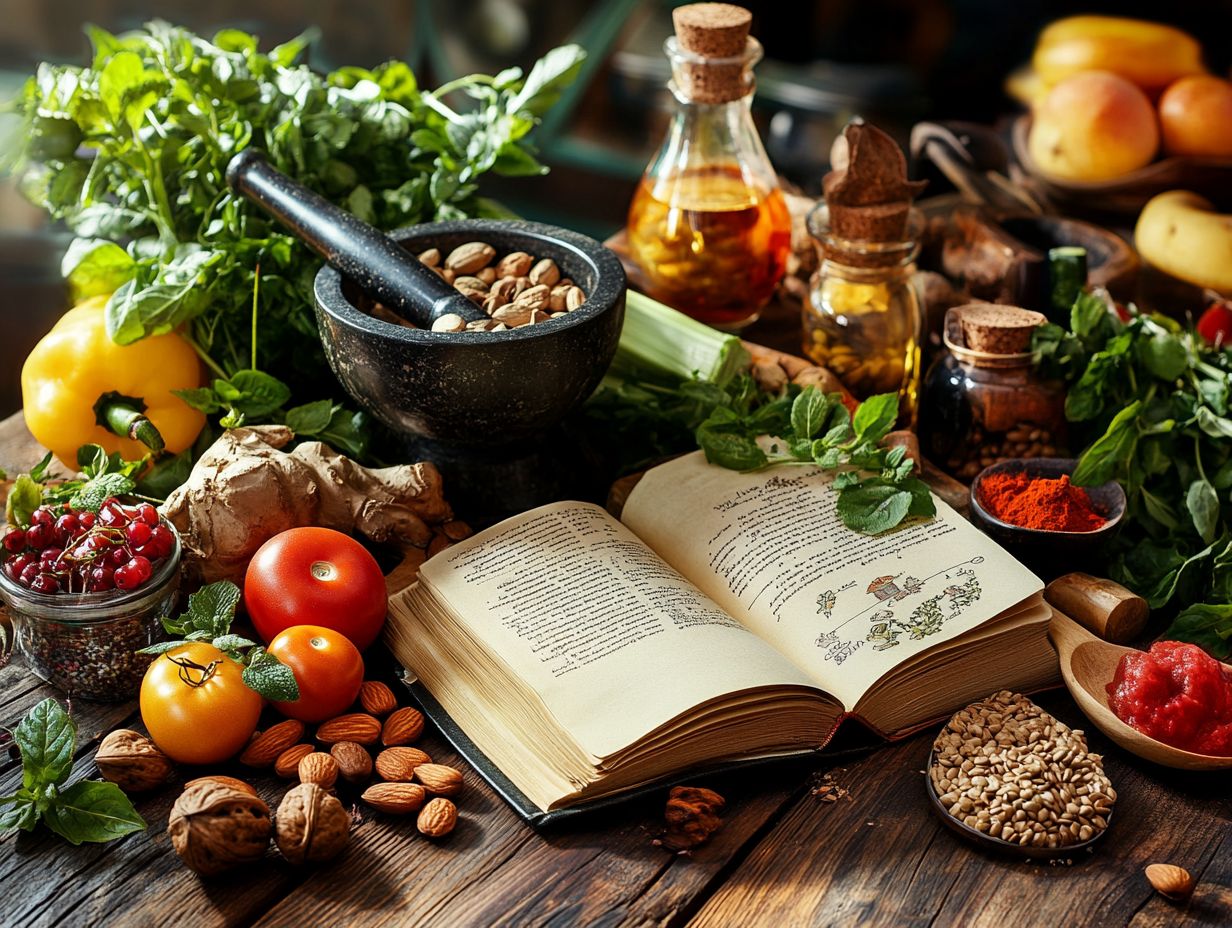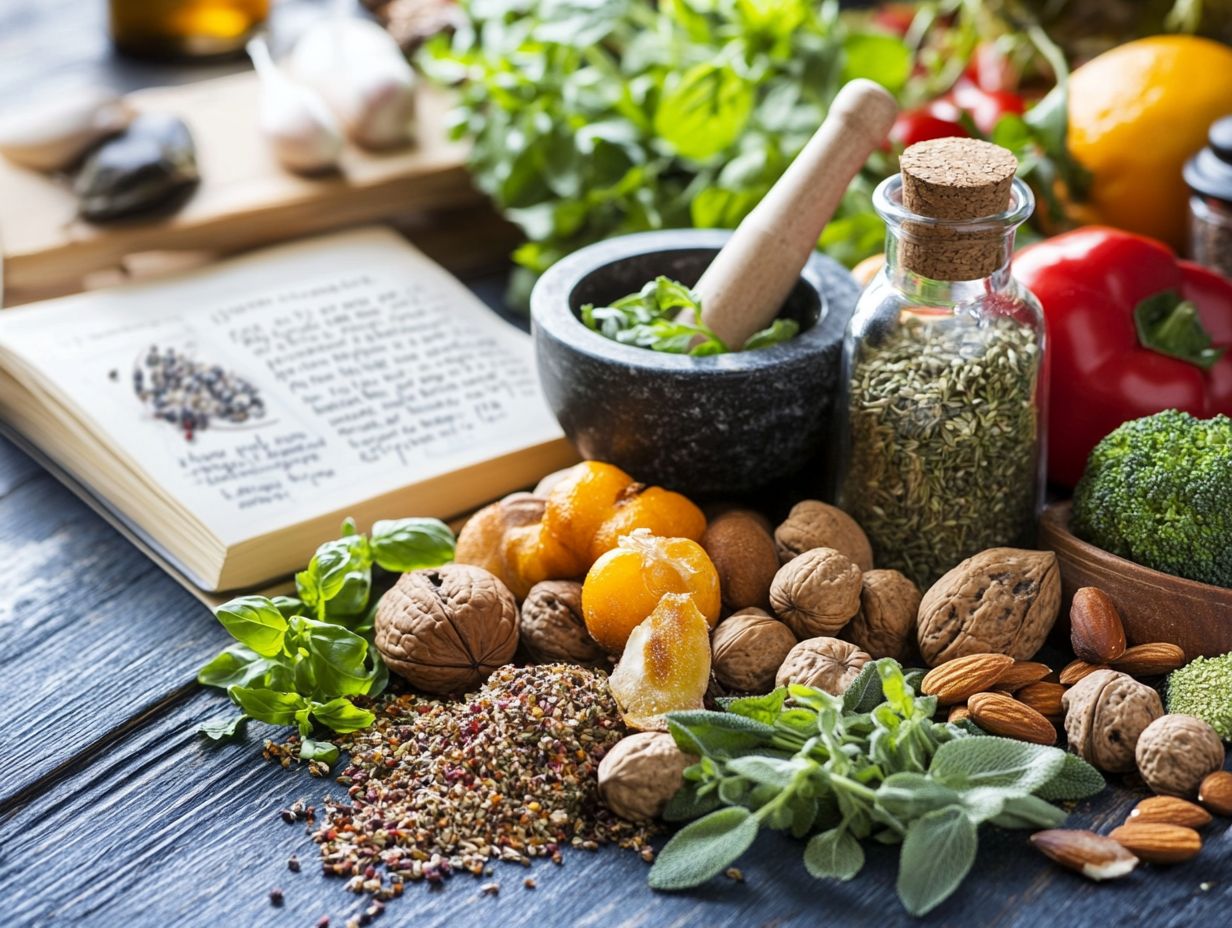What Is the Role of Nutrition in Alternative Medicine?
In today’s health landscape, the intersection of nutrition and alternative medicine is capturing your attention like never before. Understanding how your dietary choices influence overall well-being and healing processes empowers you to take charge of your health in a meaningful way.
This article delves into the important role nutrition plays in both preventing and treating illness. It highlights specific nutrients that can enhance alternative therapies. You’ll also find practical tips on how to seamlessly integrate these dietary choices into your holistic treatment plans.
It also covers potential risks and guides you in finding credible information, ensuring you’re well-equipped to make informed decisions on your healing journey. Join in as you uncover the profound connection between nutrition and alternative medicine.
Contents
- Key Takeaways:
- The Relationship Between Nutrition and Alternative Medicine
- The Role of Nutrition in Preventing and Treating Illness
- Specific Nutrients and Their Benefits in Alternative Medicine
- Integrating Nutrition into Alternative Treatment Plans
- Potential Risks and Considerations
- Tips for Finding Reliable Information on Nutrition and Alternative Medicine
- Frequently Asked Questions
- What is the role of nutrition in alternative medicine?
- How does nutrition impact overall health in alternative medicine?
- Can nutrition be used as a treatment in alternative medicine?
- What are some examples of alternative medicine practices that incorporate nutrition?
- How does nutrition differ in alternative medicine compared to conventional medicine?
- Are there any risks associated with using nutrition in alternative medicine?
Key Takeaways:

- Proper nutrition plays a vital role in supporting alternative medicine treatments.
- Specific nutrients, such as vitamins and minerals, have significant benefits in alternative medicine.
- When seeking information on nutrition and alternative medicine, evaluate sources to make informed decisions for your health and well-being.
The Relationship Between Nutrition and Alternative Medicine
The relationship between nutrition and alternative medicine is closely linked, with both domains promoting a holistic approach to optimizing health and preventing disease.
Integrative medicine acknowledges the important role of nutrition in bolstering the body s natural healing mechanisms. It illustrates how functional nutrition can significantly enhance overall well-being.
By considering your unique dietary preferences and needs, alternative medicine aims to tailor dietary interventions that improve health outcomes and mitigate inflammation.
The partnership between nutrition and alternative medicine is crucial for crafting comprehensive strategies that resonate with individual requirements and foster long-term health.
Understanding the Connection
Understanding the connection between nutrition and alternative medicine is essential for your journey in effective health education and preventive medicine. This relationship emphasizes the necessity of weaving established dietary guidelines into treatment plans, significantly boosting patient outcomes.
Consider, for example, the strategies that advocate for whole foods and plant-based eating. These approaches harmonize beautifully with preventive medicine, effectively targeting the root causes of chronic diseases like diabetes and heart conditions.
Specific examples include:
- The Mediterranean diet, which has demonstrated remarkable success in reducing cardiovascular risks.
- Anti-inflammatory diets that can help alleviate arthritis symptoms.
Embrace these nutritional therapies to foster a more holistic approach in your practice. Tailor interventions to meet individual needs and enable patients to take charge of their health.
The Role of Nutrition in Preventing and Treating Illness
Nutrition is key in preventing and treating illness, acting as a cornerstone in the realm of preventive medicine and holistic health management.
Emphasizing the significance of a well-balanced diet can enhance your well-being and mitigate health risks.
How Nutrition Can Support Alternative Treatments
Nutrition plays a pivotal role in supporting alternative treatments by providing essential nutrients and promoting inflammation reduction through carefully crafted dietary strategies.
By integrating a well-rounded diet with holistic therapies, you can significantly amplify the benefits you experience. For example, functional nutrition focuses on whole foods packed with vitamins and minerals to enhance your immunity and healing process.
Dietary supplements, like omega-3 fatty acids from fish oil, are proven to reduce inflammation and improve joint health, making them perfect companions for your physical therapies.
Moreover, the antioxidants in fruits and vegetables act as a shield against oxidative stress, bolstering various alternative approaches such as acupuncture or herbal remedies. These dietary elements harmonize beautifully with the principles of alternative medicine, encouraging a balanced and proactive approach to your overall wellness.
Start implementing these nutritional strategies in your life today for a healthier tomorrow!
Specific Nutrients and Their Benefits in Alternative Medicine

Specific nutrients like vitamins, minerals, antioxidants, and phytonutrients play a vital role in alternative medicine. They support bodily functions and enhance overall health.
Vitamins, Minerals, and Other Key Nutrients
Vitamins and minerals are important for your health. They prevent deficiencies that can lead to chronic diseases.
For example, vitamin D helps absorb calcium, which keeps bones strong. B vitamins are essential for converting food into energy.
To meet your nutritional needs, aim for a balanced diet rich in fruits, vegetables, whole grains, and lean proteins.
Sometimes, dietary choices alone may not suffice, making supplements a practical option.
Integrating Nutrition into Alternative Treatment Plans
Including nutrition in your treatment plans is vital for a personalized approach. This ensures your care supports your unique health needs.
How to Incorporate Nutrition into Your Healing Journey
Recognize the importance of a balanced diet for your health. Taking steps towards this balance can enhance your recovery.
Start by learning about the nutrients your body needs. Local workshops or online courses can be helpful.
Consider consulting a dietitian. They can create meal plans that are both delicious and healing.
Potential Risks and Considerations
While nutrition is a powerful ally in alternative medicine, it may also come with risks that require careful consideration.
Possible Interactions and Side Effects

Interactions and side effects of supplements and foods can complicate your nutritional therapy. This is especially true if you have allergies or sensitivities.
Understanding these challenges empowers you to create effective nutrition plans. Some supplements may affect nutrient absorption and potentially trigger allergic reactions.
Identifying your allergies gives you insight into how specific foods impact your health. A tailored approach should focus on your unique needs.
Tips for Finding Reliable Information on Nutrition and Alternative Medicine
Finding trustworthy information is essential for making informed health decisions. Prioritize credible sources to navigate these important topics confidently.
Start your journey to better health today by seeking out trusted resources!
How to Evaluate Sources and Make Informed Decisions
Evaluating information sources is crucial for making informed decisions in nutrition and alternative medicine. It ensures you receive accurate, fact-based guidance.
When navigating the vast sea of nutritional advice, consider various criteria to assess the credibility of these sources. Health professionals often emphasize the importance of the author’s qualifications and peer-reviewed publications, which provide a solid foundation for the claims made.
Look for transparent references and a logical presentation of facts, as these elements typically differentiate trustworthy resources from dubious ones.
For practical examples, consider contrasting a website that cites clinical studies and features registered dietitians with one that offers anecdotal stories lacking scientific support.
By engaging in nutritional counseling and health education, you can better discern reliable information, empowering you to make healthier choices. Start evaluating your sources today to make healthier choices tomorrow!
Frequently Asked Questions
What is the role of nutrition in alternative medicine?
Nutrition is a game-changer in alternative medicine! It focuses on using natural methods and remedies to support the body’s healing process. Proper nutrition enhances overall health and helps prevent diseases.
How does nutrition impact overall health in alternative medicine?

In alternative medicine, nutrition is the foundation of good health. A diet rich in whole, unprocessed foods provides essential nutrients and supports the body’s natural healing abilities.
Can nutrition be used as a treatment in alternative medicine?
Absolutely! Nutrition is often used as a treatment in alternative medicine. Certain foods and supplements are believed to possess healing properties that can address specific health conditions and promote overall wellness.
What are some examples of alternative medicine practices that incorporate nutrition?
Examples of alternative medicine practices incorporating nutrition include herbal medicine, Ayurveda, traditional Chinese medicine, and naturopathy. These practices frequently utilize specific diets and food-based treatments to promote healing and prevent diseases.
How does nutrition differ in alternative medicine compared to conventional medicine?
Nutrition in alternative medicine focuses on whole, natural foods to support healing, while conventional medicine may lean more towards pharmaceuticals and supplements. Alternative medicine often takes a holistic approach, considering the mind, body, and spirit, whereas conventional medicine usually focuses on treating specific symptoms.
Are there any risks associated with using nutrition in alternative medicine?
While proper nutrition is generally safe, it’s essential to consult with a healthcare professional before making significant dietary changes, especially if you have underlying health conditions. Some herbal supplements and alternative remedies may interact with certain medications, so discussing this with your healthcare provider is crucial.






